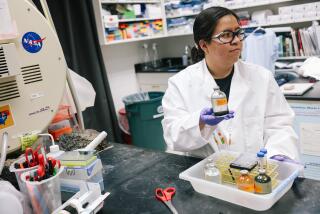Talk Is Anything but Cheap at La Jolla’s Salk Institute
- Share via
When it comes to science, researchers at the Salk Institute in La Jolla are at the top of the heap: trying to crack the secrets of AIDS, gene therapy, what makes the brain tick, and more.
But in media relations, Salk lags.
Unlike UC San Diego and other science centers, Salk
does not have a public-affairs staff that encourages media attention. Interviews are rare.
The late Frederic de Hoffman, Salk president from 1972 to 1988, was a strong-willed nuclear physicist who had worked on the Manhattan Project and at General Atomics. He preferred that reporters be kept at bay.
Under De Hoffman’s successor, Salk, a private institution that receives federal funds, has gone a step further by establishing an informal policy of asking for money, in some cases, before agreeing to interviews.
A documentary film maker from Los Angeles was told last week it would cost $10,000 for an hour interview with Salk President Dr. Renato Dulbecco, who received the Nobel Prize in 1975 for virus research.
Lacking a spare 10 grand, the film maker left.
Kenneth Klivington, an assistant to Dulbecco, said Salk researchers will continue to do some free interviews but will seek payment when they feel the interviewer is demanding too much time, is ill-prepared, or is just “fishing” for a story.
“The goal of the Salk Institute is to create an environment devoted entirely to research,” Klivington said. “Interviews can be very disruptive. We will continue to cooperate when there is truly a newsworthy reason, but there will be cases when payment seems appropriate.”
Pierre Kandorfer, the film maker, said he was “stunned” by the request.
He’s doing a documentary for French television on whether the United States can maintain its competitive edge in scientific research. He’s arranged free interviews with scientists at Caltech and UC Berkeley.
Charles Petit, science writer for the San Francisco Chronicle and president of the 1,500-member National Assn. of Science Writers, said he’s never heard of a science institution charging for interviews. He called the idea “dumb.”
Well, It’s Different
Items everywhere you look.
- The Central City Assn. stickball tournament trophy was delivered Thursday to the Hall of Champions. It takes a place of honor March 29.
You can’t miss it. It’s the one with a hubcap from a ’57 Chevy and two stickball bats made from broom handles.
- Hide the bureaucrats and the statists. The Libertarian Party state convention opens today at the Hanalei Hotel in Mission Valley.
Opening act is the unveiling of the advertisement that Libertarians have placed in the national Colombian newspaper to coincide with President Bush’s attendance at the drug summit in Cartagena.
The ad says Libertarians believe the drug wars will end only when drugs are legalized.
- Kee McFarlane, the Los Angeles social worker whose interviews were central to the McMartin child molestation case, is married to San Diego County Deputy Dist. Atty. Harry Elias.
Elias heads the D.A.’s child abuse unit. The couple met at a child abuse seminar in late 1986 and married a year later.
Robbery Not Par For the Course
Gentlemen, pick your weapons.
- Two golfers from Vista were robbed while playing at the Fallbrook Country Club.
The twosome had just teed off and were searching for a ball in the rough. A scruffy fellow emerged from the bushes and demanded money.
One of the golfers pulled a putter. The scruffy fellow then pulled a gun. He got away with $100 plus credit cards.
- Trent Archer explains why ads for his stun-gun company are on the door to the outhouse on the bluff over Black’s Beach.
“I’m a surfer, and Black’s is my favorite spot,” he says. “It seemed natural.”
A surfer selling stun guns. Only in San Diego.






